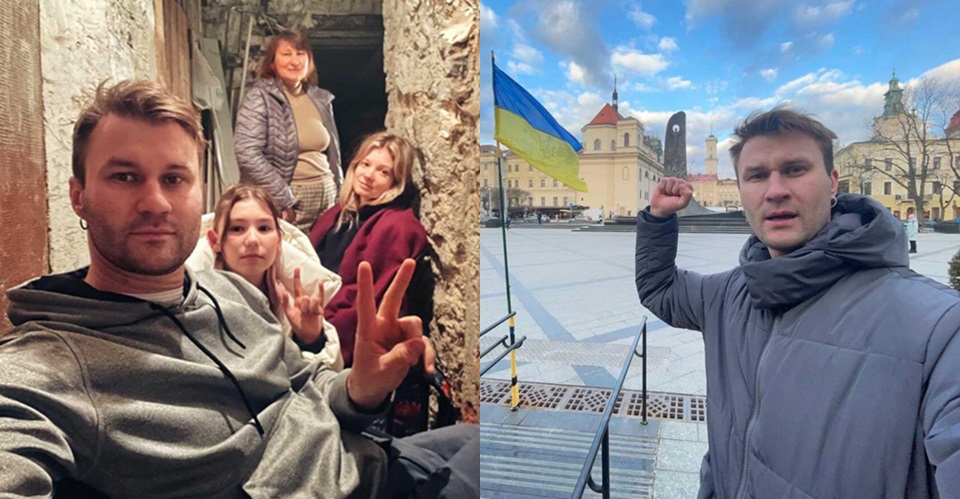In a city holding its breath, he learned that resistance takes many forms: open doors, steady truth, and the simple promise to stay, help, and hope until home is whole again. On the fourth morning of the invasion, he and his wife woke up without the air-raid siren for the first time. They had slept in the hallway to keep away from the glass, shoes by the door, and backpacks ready. Four days felt like a year. Day one was disbelief, missiles nationwide, lines at ATMs, pharmacies, gas, and groceries. He called family, set a backup meeting spot, and tried to cover the basics.

Day two became logistics. He gathered his mother, sister, and mother-in-law into their apartment in the center of Lviv so they could stay together. He checked on his work team and asked, “What’s the most useful thing we can do?” As trains from the east poured in, he saw families arrive after 20-hour journeys, exhausted and holding onto each other. Women and children moved toward the border; men turned back to serve. Friends joined defense units; others drove people, cooked, or found medicine. He and his colleagues reshaped their marketing company into an English-language information hub. Everyone used whatever skill they had.

Alarms came a couple of times a day. He kept an emergency backpack by the door. Lviv still ran, trams were on schedule, shops were open, and defenses were dug around the city. If you blocked out the news, you might not notice a war at first glance. But the streets were filled with refugees; the hum felt like a busy tourist season with grief underneath. He kept repeating a line he loved, What are we fighting for if not culture? In Lviv, a gallery owner turned his art space into a shelter and a small command center for cultural workers. His wife, who leads an association of gallerists, coordinated cultural diplomacy from their city, proof that identity and art are part of defense.

His mother, sisters, and toddler nephew tried to leave. They faced checkpoints, traffic that didn’t move, and nights in cold country houses. He watched thousands do the same: pregnant women, expats, grandparents, children in puffy coats clutching toys. One day, he took a short walk and saw two Lvivs within minutes, sun on a quiet cathedral square, then chaos near the station: roadblocks, buses only, crowds sprinting for tickets, ATM lines curling down the street, faces hollow with shock.
It stunned him. Then came the hardest personal choice. With his mother and sisters gone, he and his father moved his grandmother to a nursing home for her safety, something Ukrainian families rarely do. She had cared for him as a boy; now she barely recognized him. He dressed her, held her, and cried all day. It felt like closing the door on a room from his childhood. It was the last thing that needed doing so everyone could be safe.

Over the last 15 years, he had traveled to 129 countries and chose to come home two days before the war began. Messages from friends everywhere flooded in, offering beds, cars, and hands. Crossing into Poland was impossible for his family, so they pushed south through the mountains and into Hungary at night. A friend in Budapest took them in. They are resting there, planning the next steps. He stays in Lviv with his wife, his “queen,” who always chose to stand beside him. He visited Truskavets, a spa town turned shelter, where hotel rooms are now scarce and every bench holds a story. Western towns look like this everywhere: crowded but determined. “We’ll make space now,” he said, “and rebuild together later.”

Missiles hit a military facility northwest of Lviv, close enough to rattle nerves, not downtown. The city kept going: buses, markets, stone streets underfoot. He worried most about the old center, UNESCO-listed, a treasure that survived two world wars. Workers wrapped statues, shielded cathedral windows, and moved art to basements. He looked at the buildings and thought, This doesn’t belong only to us; it belongs to human history.
Most days, he sleeps three or four hours. He sets out water and medicine for older neighbors, answers messages from abroad, and keeps telling what he sees in plain words. He carries groceries, checks his phone for updates, and breathes between alarms. He learned that courage isn’t only on the front line; sometimes it’s in a hallway on a blanket, in a gallery turned shelter, in a son lifting his grandmother’s coat one careful sleeve at a time. He also learned how fast a city can become two cities, one peaceful block, one block of flight, and how quickly ordinary people become a network of helpers.

He doesn’t know when the sirens will stop or when his family will return. He knows only this: even in a quiet square, the war is there, and even in a crowded station, kindness keeps showing up. He will keep his bag by the door, keep his hands busy, keep his voice steady, and keep loving the place that made him.











